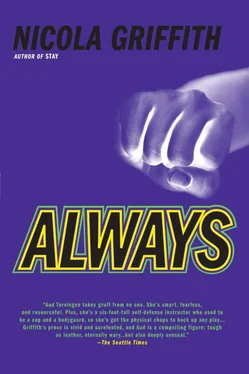Back on the set, I wandered over to the craft-services table. The woman behind the counter was standing around looking bored.
“Kick around?”
“Nope. Taking a break.”
“Know where she went?”
“Nope. For a walk or something. Said they’d be back in”—she looked at her watch—“I guess about forty-five minutes from now.”
They.
“Hey, want some coffee?”
“No. Thank you.”
“That’s what everyone says these days.”
I COULD GOtalk to the Times reporter. I could go to the police and use my mother’s name. I could forget letting Corning soften herself up in a fear marinade and go find her. But if anyone gave me information I didn’t know where it might lead me, and yesterday, on the hill, I had found myself breathless. There might be other shortcomings I wouldn’t notice until I leaned on them and found them wanting.
GOOD DOJOSare often found in bad neighborhoods. Seattle Aikikai was on Aurora alongside Korean massage parlors, a gun shop, and several love motels.
The dojo smelled deeply familiar: chalk, sweat, the white vinegar used to keep the canvas mat clean and bleached. One young woman and five men were stretching on the smaller mat. They were friendly enough. A heavyset Chinese-American introduced himself as Mike. The woman said her name was Petra and that if I didn’t have a gi, I could see if any of the ones hanging in the women’s changing room would fit. The changing room was tiny, with flimsy walls and a crooked shower stall no doubt installed by a hapless volunteer. The pleasantly amateur feel reminded me of my first martial arts classes in England. I hung my dress on a hanger and contemplated the gi s. None of them would ever see bright white again, but one tunic was reasonably clean. The cleanest trousers were too small, and the white belt stiff and difficult to tie.
There were covert glances when I came out to stretch, but it was considered impolite to ask questions or appear to be interested in another’s level of training. Aikido is built on Taoist principles; competition is frowned upon.
When the bell chimed twice, we moved to the large mat and knelt in a line along the long side. Despite the supposed lack of competition, it was traditional to line up according to rank; as the newcomer, untested, I politely took the low-rank spot on the right. Mike took the left-hand position. The sensei, full of his own dignity, descended magisterially from upstairs, hakama s, the bloused trousers of dan rank, swishing like a long skirt. The students exuded awe; I guessed he was very high-ranking, sixth or seventh dan. He was in his early forties, and his hands were reddish around the knuckles. His hair was very dark brown, and crinkly, and his forehead crinkled to match when he saw the newcomer in the ill-fitting gi in his dojo, but the ceremony had begun and there would be no talking until after the final bow.
We all bowed to the kamiza in the center of the long wall, then he turned and we bowed to him and said in unison, “O-ne-gai-shimasu.” Please practice with me.
He moved through what was obviously an unvarying set of warm-ups, which began with loose shoulder swinging, moved on to spine stretching, wrist working and blending exercise, and ended with shikko, a kind of duck-walking on the knees, and finally roll-outs, forward and back. Everyone moved easily, and I guessed none had been studying less than a year. Serious students.
We knelt in our line again, and the sensei motioned Mike onto the mat as his attacker, or uke. They stood in hanmi, though Mike began with right foot forward rather than left and had to change. Probably left-handed.
“Shomenuchi,” the sensei said, and Mike stepped forward smoothly with a right-hand knife-hand chop at the sensei’s forehead.
In karate or judo, the nage would block solidly, meeting strength with strength, the muscle-sheathed arm bones clashing like swords. If you were good, if you struck at the right angle and speed, your opponent was already off balance and in pain by the time you punched out his floating ribs, if you were a karateka, or took him crashing to the mat, if you were a judoka. It was a wasteful way to work, with so much effort expended in negating one force with another.
When Mike’s hand came down, there was no bone-on-bone shock, no meeting of force at all. The sensei stepped out of the way, an easy turn at the hip and glide back and out, and laid the side of his right hand on the uke ’s right wrist, the left hand behind his right elbow, then was behind the uke, guiding him, helpless in a stiff arm bar, along his original path, facedown to the mat, where he was pinned. It was like watching a leaf get sucked into a whirlpool.
A young man made a late entrance and hurried through his bow and rushed into the men’s changing room.
“Shomenuchi ude osae,” the sensei said, describing the technique, and Mike slapped the mat twice, and the sensei let him up. He demonstrated twice more, slowly, and then once at full speed. The final time, Mike slapped the mat in earnest, and when he stood, he was sweating.
The newcomer came out to the mat, still tying his belt, but instead of kneeling he waited for me to move down a space. When in Rome.
Sensei gestured us to our feet. The others paired off instantly, which left me with New Boy. He bowed at me sulkily, and assumed hanmi, waiting. I dutifully stepped into shomenuchi.
He was rushed, and clumsy, and if I’d been a beginner he might have sprained my shoulder, but he was uncertain enough that my arm was not fully extended, and he moved stiffly, using muscle rather than technique, and I could control him without appearing to and go down without injury. He frowned. He knew something wasn’t exactly right, but had no idea what.
Part of the noncompetitive ethos of aikido is to help and guide each other: the uke helps the nage with the technique; the nage ensures that the uke goes down without injury. The greater the disparity in skill, the greater the responsibility. A ninth dan should be able to take down a rank beginner with speed, grace, and precision, without anyone getting a bruise. He should be able to help the beginner do the same to him.
The woman who had taught me aikido in Atlanta, Bonnie, had talked about sensing ki, and blending energies. She showed me an exercise called the unbending arm. We faced each other, and she asked me to hold my right arm out straight and make a fist. Then she turned it palm up and laid my right forearm on her shoulder. “Don’t let me bend it,” she said, and interlaced her hands, and began to press down at the elbow. I gritted my teeth and locked my arm. “You’re strong,” she said, but after three or four seconds, my arm bent. She smiled cheerfully. “Want to see if you can make me bend my arm?” So we exchanged positions, and I pulled on her elbow, and nothing happened. She looked bored, even pretended to yawn while I grunted and exerted more and more pressure. “You look like you’re going to burst something,” she said. So I asked her what the trick was. “Trick? It’s not a trick. Here, put your arm back up.” I did. “Now bend it a little. And spread your fingers wide. Relax, relax your shoulders and neck and back. Root your feet to the earth.” The earth was covered in concrete foundation, steel I-beam construction and bamboo flooring, but I didn’t comment. “Now feel the energy coming up from the earth and through you and down your arm. Stay relaxed, keep your fingers open. Channel your ki through your fingers. It’s pouring out of you in a stream of light.” And my arm didn’t bend, and it took absolutely no effort. And I didn’t understand it at all.
Читать дальше












